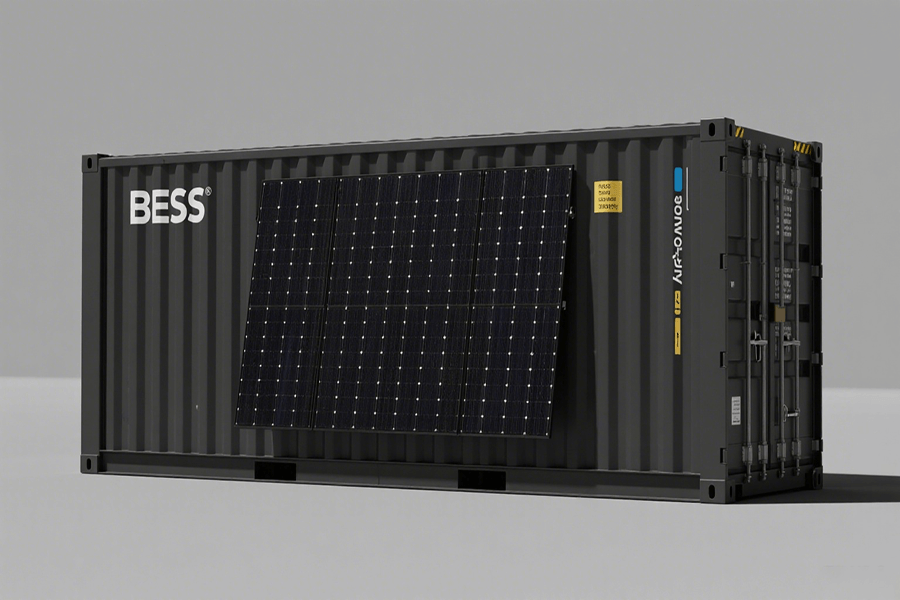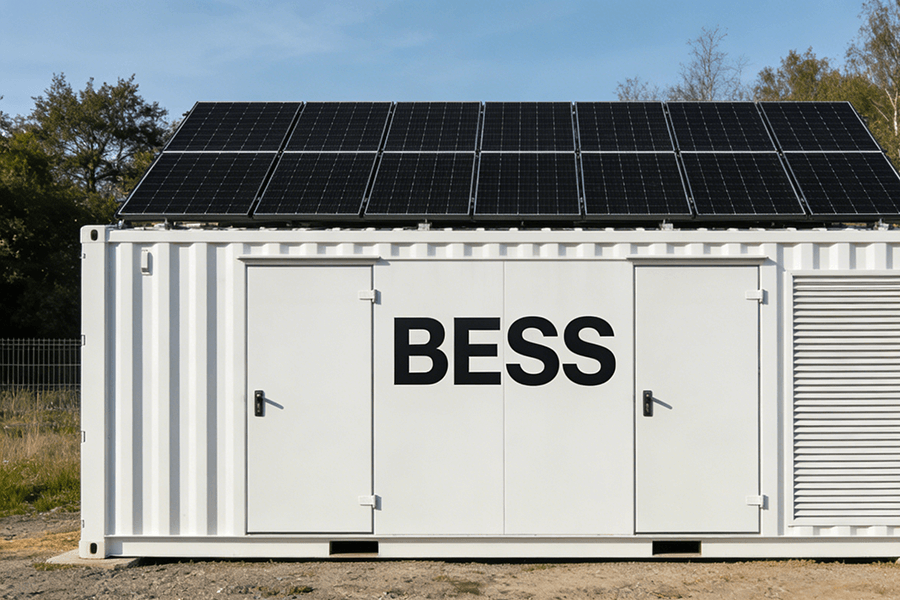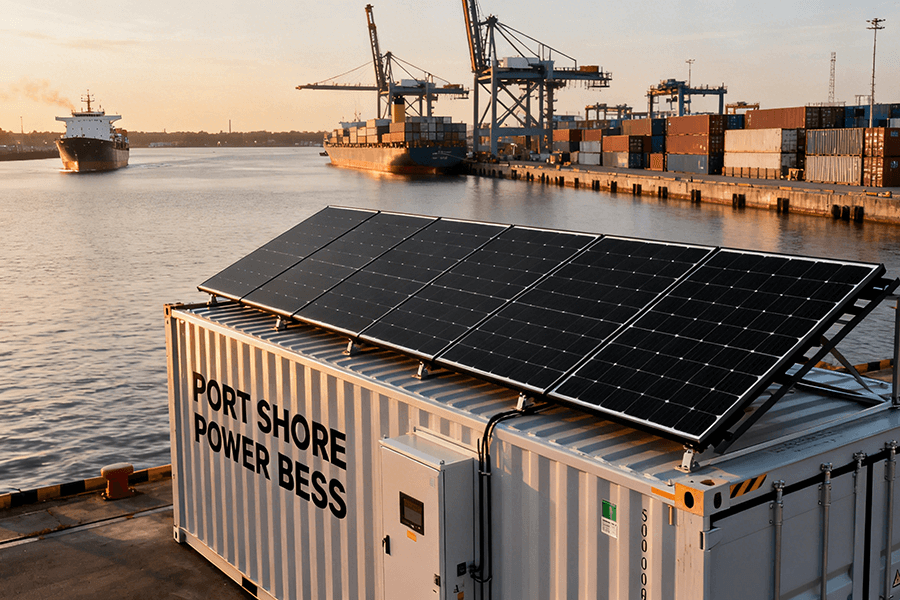
In the ever-evolving landscape of the European Union’s energy transition, small and medium-sized enterprises (SMEs) are the unsung heroes. They drive local innovation, create jobs in every corner of the bloc, and contribute significantly to regional economies. However, when it comes to adopting energy storage solutions—a critical step toward reducing operational costs and meeting sustainability goals—these vital businesses are hitting a financial wall. Let’s explore how BESS Container as a Service (BESSaaS) is breaking down that wall, one kilowatt-hour at a time.
| Statistic | Percentage/Proportion |
|---|---|
| Share of total EU enterprises | 99.8% |
| Proportion of total workforce employed | ~66.7% |
| Contribution to EU’s total value-added | ~60% |
These figures underscore SMEs’ crucial role in driving the bloc’s economic growth, yet their potential remains hampered in certain key areas.
One such area is the adoption of energy storage technologies. Despite the numerous benefits that battery energy storage systems (BESS) offer—such as reducing peak electricity costs, enhancing grid stability, and facilitating the integration of renewable energy sources—SMEs have been slow to embrace them. A 2024 survey by Eurelectric, a leading voice in the European electricity industry, sheds light on the barriers preventing wider adoption:
- Cost Constraints: A staggering 50% of SMEs cited high upfront costs as the primary deterrent to investing in BESS. For context, the initial investment for a BESS can range from €50,000 to €200,000, a significant financial burden for resource-constrained businesses.
- Lack of Technical Expertise: Many SMEs lack the in-house expertise to assess the technical viability and long-term benefits of BESS, leading to hesitancy in making investment decisions.
- Uncertainty about Return on Investment: With varying electricity tariffs, regulatory frameworks, and technological advancements, SMEs often struggle to accurately predict the return on their BESS investment, further dampening their enthusiasm.
Consider the case of a small bakery in Lisbon or a family-owned manufacturing firm in Warsaw. For these businesses, allocating a substantial portion of their working capital to a BESS purchase could mean sacrificing critical operational needs, such as paying employee salaries, maintaining inventory levels, or pursuing growth opportunities.
This is where BESS Container as a Service (BESSaaS) emerges as a game-changing solution, offering SMEs a flexible and cost-effective alternative to traditional capital expenditure models.
What is BESSaaS? A Game-Changer for SMEs
BESSaaS reimagines how SMEs access energy storage. In contrast to the conventional “buy-it-all-upfront” model, which demands substantial capital expenditure and exposes businesses to risks associated with technological obsolescence, BESSaaS operates on a pay-per-kWh basis—akin to the “Netflix of energy storage.” Under this innovative approach, businesses forgo system ownership and instead pay exclusively for the energy storage services they consume, eliminating the need for hefty initial investments and allowing them to allocate resources more strategically.
This model aligns seamlessly with the core priorities of SMEs:
- Cash Flow Preservation: By avoiding large upfront costs, SMEs can channel funds towards critical business operations, such as product development, marketing, and talent acquisition, ensuring financial stability and growth.
- Asset Depreciation Risk Mitigation: Owning energy storage assets exposes businesses to depreciation and technological advancements. BESSaaS shifts this risk to providers, enabling SMEs to benefit from cutting-edge technology without bearing the brunt of obsolescence.
- Flexibility and Adaptability: As energy demands fluctuate due to seasonal variations, business expansion, or regulatory changes, BESSaaS allows SMEs to scale their storage capacity up or down with ease, ensuring optimal resource utilization and cost efficiency.
BESSaaS Service Models: Tailored Contracts for Diverse Needs
BESSaaS providers offer a range of contracts designed to meet the unique requirements of SMEs, typically spanning 3 to 10 years. These contracts prioritize transparency and simplicity, with all-inclusive terms that eliminate hidden costs and provide peace of mind.
| Contract Term | Key Inclusions | Typical Cost Range (per kWh) | Ideal For |
|---|---|---|---|
| 3–5 years | Basic maintenance, 24/7 remote monitoring, access to energy management software | €0.12–€0.15 | Startups and SMEs testing energy storage solutions or with variable needs |
| 6–10 years | Comprehensive maintenance, performance guarantees, scalability options, demand response integration | €0.10–€0.13 | Established SMEs with stable energy demands seeking long-term cost savings |
Table 1: Common BESSaaS Contract Structures for EU SMEs
For illustrative purposes, consider a 5-year contract for a 500 kWh system. Under this arrangement, an SME would pay €0.14 per kWh, with all maintenance costs—including battery replacements, software updates, and technician visits—covered. This predictability empowers SMEs to budget accurately, shielding them from financial shocks associated with unexpected repair bills and ensuring consistent operational costs.
Aligning with EU Support: The SME Instrument Program
The EU is actively promoting the adoption of clean technologies among SMEs, recognizing their potential to drive sustainable growth and reduce carbon emissions. BESSaaS aligns perfectly with this agenda, offering a cost-effective and scalable solution for energy storage.
The SME Instrument program, a key component of Horizon Europe, provides substantial financial support to SMEs seeking to integrate innovative clean technologies. Grants and funding ranging from €50,000 to €2.5 million are available for eligible projects, enabling businesses to offset a significant portion of their BESSaaS costs.
For instance, a small brewery in Prague could leverage a €100,000 SME Instrument grant to cover 30% of its BESSaaS expenses over a 5-year contract. This not only makes the service more affordable but also positions the brewery as a sustainable business, enhancing its brand reputation and attracting environmentally conscious consumers. In essence, the EU’s support acts as a catalyst, making BESSaaS an even more attractive option for SMEs looking to transition to clean energy solutions without compromising on financial viability.
The Benefits: A Win-Win for Everyone
BESSaaS isn’t just a band-aid for SMEs’ financial woes—it’s a mutually beneficial solution that works for both businesses and service providers.
For SMEs: No CAPEX, More Savings
Embracing BESSaaS revolutionizes the financial landscape for small and medium-sized enterprises by eliminating significant capital expenditure barriers and unlocking substantial savings.
- Zero upfront costs: Traditional Battery Energy Storage System (BESS) installations demand hefty initial investments, often straining SMEs’ budgets. For instance, a medium-sized hotel in Barcelona would typically shell out €150,000 upfront for a 1 MWh system. With BESSaaS, this financial burden vanishes, allowing businesses to reallocate these funds towards critical areas such as property renovations or strategic hiring initiatives.
- 20% lower energy bills: A 2023 report by the International Renewable Energy Agency (IRENA) revealed that SMEs leveraging energy storage services enjoy an average reduction of 20% in their energy costs. This remarkable saving is achieved through strategic energy management:
-
- Off-peak energy storage: During off-peak hours, typically between 2–6 AM, electricity prices drop significantly, averaging around €0.05/kWh. BESSaaS enables SMEs to store electricity at these lower rates.
-
- Peak-hour utilization: When peak hours arrive, usually from 6–10 PM, electricity prices can spike up to €0.25/kWh. By using the stored energy during this period, businesses can avoid the high costs. For example, a Parisian restaurant that experiences peak energy consumption during dinner service could save up to €12,000 annually through this strategy alone.
For Providers: Revenue Stacking Like a Pro
BESSaaS providers have the opportunity to build a robust and diversified revenue model, transforming their business into a lucrative and sustainable venture.
- Energy arbitrage: Operating on the tried-and-true principle of “buy low, sell high”, providers purchase electricity during off-peak hours at a low rate of €0.05/kWh and sell it to SMEs during peak hours at a higher rate of €0.15/kWh, thereby generating a healthy profit margin.
- Grid services: BESS containers are highly responsive to grid fluctuations, positioning them as an excellent solution for maintaining grid stability. In the EU’s primary control reserve market, providers can earn up to €200/MWh by offering these crucial stability services.
- Long-term contracts: Establishing 3–10 year agreements with SMEs not only provides providers with a consistent and predictable revenue stream but also makes their business more appealing to potential investors. This financial stability is essential for providers looking to scale their operations and expand their market reach.
Smart Contract Tips for SMEs
Not all BESSaaS contracts are created equal. To avoid potential pitfalls and ensure a mutually beneficial agreement, SMEs should pay close attention to these crucial clauses:
Performance Guarantees
A robust BESSaaS contract should include explicit performance guarantees, ensuring that you receive the value you’re investing in. These guarantees safeguard your interests and maintain the reliability of the energy storage system. Here are the key aspects to look for:
- Storage Capacity: A high-performing BESS should maintain its efficiency over time. A standard clause might read: “The system will maintain at least 95% of its rated capacity for the initial 5 years, and 85% for years 6–10.” This ensures that the storage system remains effective throughout the contract period, providing consistent energy support for your business operations.
- Discharge Efficiency: Efficiency is key when it comes to energy storage. An effective contract should stipulate: “At least 90% of stored energy will be usable, with no more than 10% lost due to inefficiencies.” This clause minimizes energy waste, optimizing the return on your investment and ensuring cost-effectiveness.
- Downtime Limits: Unplanned downtime can disrupt business operations and lead to financial losses. To mitigate this risk, contracts should specify: “No more than 48 hours of unplanned downtime per year, with compensation provided for extended outages.” This ensures that any unexpected interruptions are addressed promptly, and you’re fairly compensated for any resulting losses.
Scalability Clauses
Businesses are dynamic, and their energy needs evolve over time. A flexible BESSaaS contract should adapt to these changes, offering the following scalability options:
- Capacity Expansion: As your business grows, so will your energy requirements. Look for a clause that allows you to: “Increase capacity by 50% with 30 days’ notice, such as adding a second container in the event of factory expansion.” This flexibility ensures that your energy storage system can keep pace with your business growth, providing seamless support for increased operations.
- Cost Adjustment: Scaling up your energy storage should not come with hidden costs. A fair contract will state: “Costs will be adjusted proportionally, with no penalty fees for scaling up.” This transparency ensures that you only pay for the additional resources you use, maintaining predictability in your budget.
- Early Termination: In cases where your energy needs decrease, for example, if you transition to 100% on-site solar, the contract should allow for: “Early termination with minimal fees.” This clause provides you with the freedom to adapt your energy strategy as your business evolves, without being burdened by excessive financial obligations.
Target Sectors: Who Benefits Most?
While BESSaaS offers significant advantages across various industries, the following sectors stand to gain the most from its implementation:
Manufacturing
Manufacturing facilities often experience highly variable energy consumption patterns. During active production shifts, energy demand surges as machinery operates at full capacity, while it drops considerably during breaks and off-hours. BESSaaS addresses these fluctuations effectively:
- Cost Savings on Peak-Demand Charges: Industrial electricity bills frequently include substantial peak-demand charges, which can constitute up to 30% of the total cost. By utilizing BESSaaS, factories can reduce their reliance on the grid during peak-demand periods, thereby minimizing these costly charges.
- Reliable Backup Power: Grid outages can have a devastating impact on manufacturing operations, leading to production halts, damaged equipment, and missed deadlines. BESSaaS provides a reliable source of backup power, ensuring continuous production and safeguarding against these losses.
Case Study: Metalworking Shop in Düsseldorf
A metalworking shop in Düsseldorf implemented BESSaaS and witnessed remarkable results. By reducing its peak-demand usage, the shop was able to cut its annual peak-demand costs by €8,000, translating into significant long-term savings.
Hospitality
The hospitality industry, including hotels, restaurants, and bars, operates around the clock and experiences significant energy spikes during peak business hours, such as meal times and check-ins. BESSaaS offers tailored solutions to meet the unique energy needs of this sector:
- Lower Evening Energy Costs: In the evenings, when air conditioning, ovens, and lighting systems are in full operation, energy consumption reaches its peak. BESSaaS enables hospitality establishments to store excess energy during off-peak hours and use it during these high-demand periods, reducing their reliance on expensive grid power and lowering their overall energy costs.
- Uninterrupted Service: Power outages can severely disrupt the guest experience, leading to negative reviews and lost business. BESSaaS ensures uninterrupted service by providing backup power during outages, allowing hotels to maintain essential services such as lighting, air conditioning, and reservation systems.
Case Study: 50-Room Hotel in Athens
A 50-room hotel in Athens adopted BESSaaS and achieved impressive savings. By optimizing its energy usage and avoiding costly outages, the hotel was able to save €15,000 per year on energy costs and maintain high guest satisfaction levels.
Agriculture
The agriculture sector, including farms and greenhouses, depends on a consistent and reliable energy supply for various critical operations, such as irrigation, climate control, and machinery. BESSaaS offers several benefits that are particularly valuable for agricultural businesses:
- Protection Against Price Spikes: During peak growing seasons, energy demand in the agriculture sector increases significantly, often leading to price spikes. BESSaaS provides a buffer against these fluctuations by allowing farmers to store excess energy during periods of low demand and use it during peak seasons, thereby reducing their exposure to volatile energy prices.
- Efficient Energy Storage: Many agricultural operations are increasingly adopting renewable energy sources, such as solar panels, to power their facilities. BESSaaS enables farmers to store excess solar energy generated during the day for use at night, ensuring a continuous and sustainable energy supply.
Case Study: Tomato Greenhouse in the Netherlands
A recent 2024 study by the Dutch Agricultural Energy Association examined the impact of BESSaaS on a tomato greenhouse in the Netherlands. The study found that by implementing BESSaaS, the greenhouse was able to reduce its energy costs by 22%, making it a more sustainable and cost-effective operation.
Maxbo Solar: Your BESSaaS Partner
At Maxbo Solar, we’re not just another BESSaaS provider—we’re your energy partner. Here’s what sets us apart:
- Custom-designed containers: We size each BESS to your exact needs, from 100 kWh for small cafes to 5 MWh for large factories.
- Smart grid integration: Our systems connect to virtual power plant (VPP) platforms, letting you earn extra income by supporting grid stability (we share 30% of grid service revenues with you!).
- EU funding experts: Our team helps you navigate the SME Instrument program, increasing your chances of securing grants (we’ve helped 75% of our clients win funding).
- 24/7 support: A dedicated account manager and 24/7 technical hotline ensure you’re never left in the dark.
Whether you’re a winery in Bordeaux or a textile mill in Lisbon, we’ll design a BESSaaS plan that grows with you. Visit www.maxbo-solar.com to schedule a free energy audit—and let’s turn your energy costs into energy savings.






